Stair Nosing: Types, Materials, and Installation Guide
A staircase needs stair nosing as its essential element to combine both functionality and visual appeal. The protective edge which protects stair treads from damage is called stair nosing. Stair nosing serves as a fundamental element in residential and commercial settings because it provides traction and defends stair edges from deterioration. The following guide provides details about stair nosing types along with materials and installation techniques and maintenance recommendations to assist your staircase selection.
Why Stair Nosing Matters
A staircase must have stair nosing because it serves multiple vital functions:
- The feature improves step visibility during low-light conditions to prevent trips and falls. According to research statistics stair falls result in thousands of annual injuries thus stair nosing proves essential for safety purposes.
- Nosing acts as a protective barrier which prevents stair tread edges from getting damaged by foot traffic and thus extends staircase lifespan.
- The selection of materials allows stair nosing to serve as an aesthetic enhancement for staircases while matching modern and traditional design elements.
- Public and commercial buildings must include stair nosing according to safety standards which are specified in Australian and Canadian building codes.
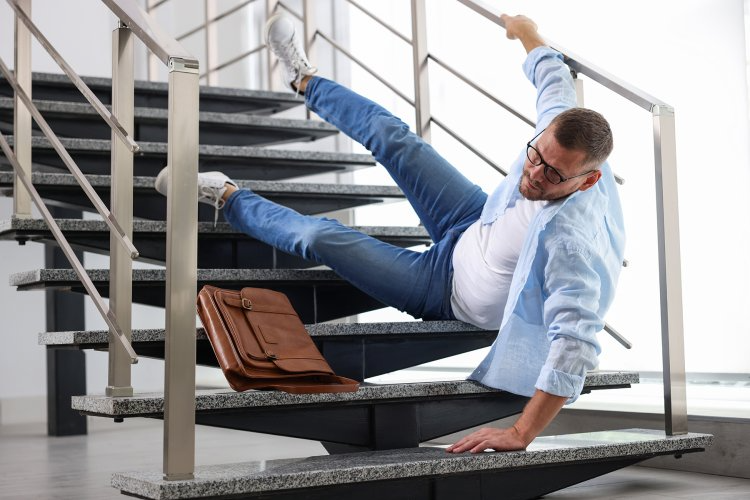
Materials for Stair Nosing
A chosen material determines both the life expectancy and upkeep requirements as well as the product expenses. The following table shows different materials used in the industry:
|
Material |
Description |
Benefits |
Best For |
|---|---|---|---|
|
Hybrid |
Multi-layer construction with a variable core. |
Durable, versatile finishes |
Modern staircases |
|
Laminate |
Multi-layer, simulates timber, available in flush face/square edge profiles. |
Cost-effective, moisture-resistant |
Budget-conscious projects |
|
Vinyl (LVT) |
Synthetic PVC, water-resistant. |
Economical, easy to maintain |
High-traffic, wet environments |
|
Engineered Timber |
Hardwood layer on a cross-laminate ply core. |
Durable, eco-friendly, stainable |
Aesthetic-focused homes |
|
Rubber |
High elasticity, strong friction. |
Superior slip resistance, easy to clean |
High-traffic commercial spaces |
|
Aluminum/Stainless Steel |
Sturdy, wear-resistant metal. |
Low maintenance, modern look |
Indoor/outdoor, heavy-duty use |
|
PVC/Plastic |
Lightweight, chemical-resistant. |
Affordable, colorful options |
Budget-friendly, versatile applications |
|
Wood |
Natural options like oak, cherry, maple, walnut. |
Classic look, customizable |
Traditional, high-end residential |
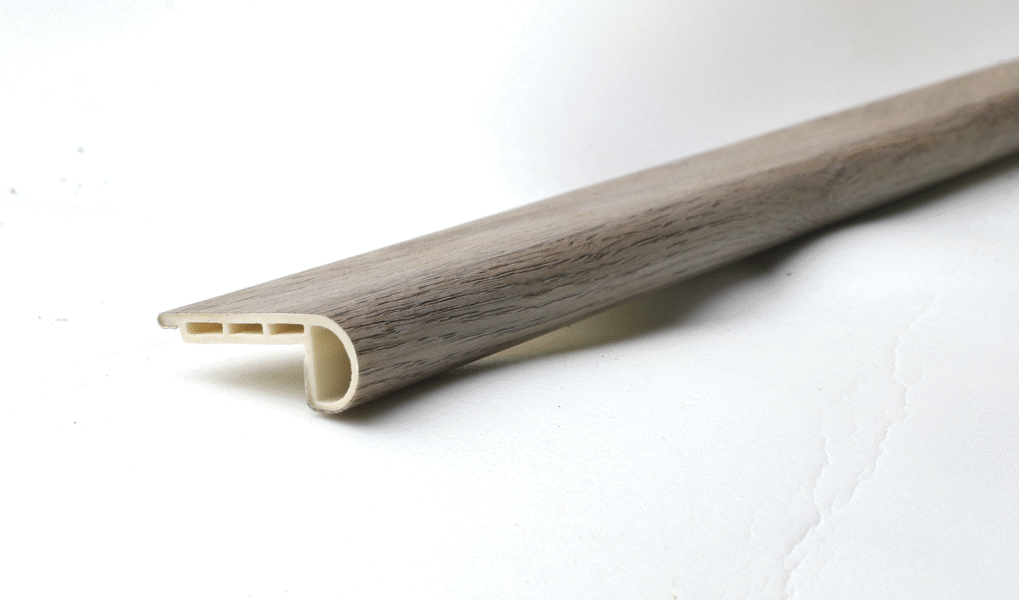
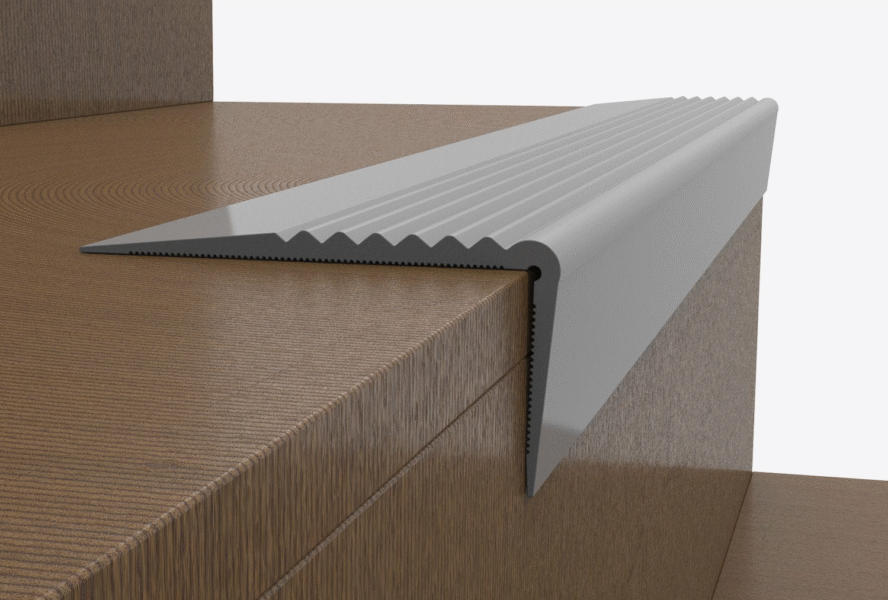
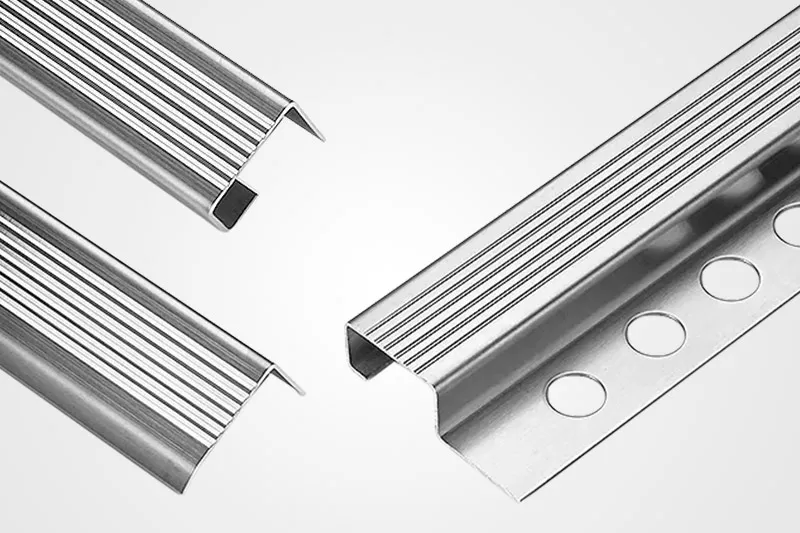
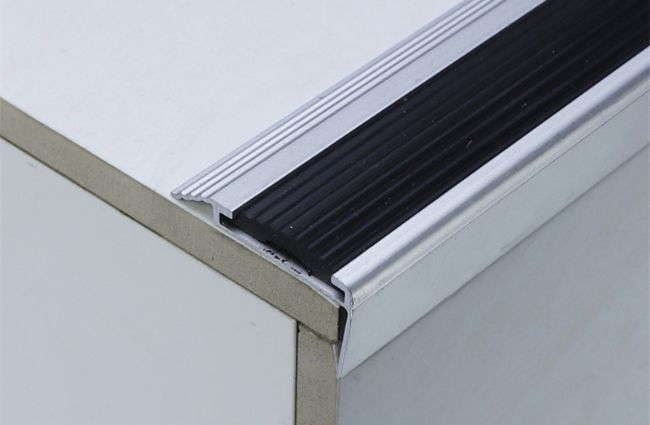
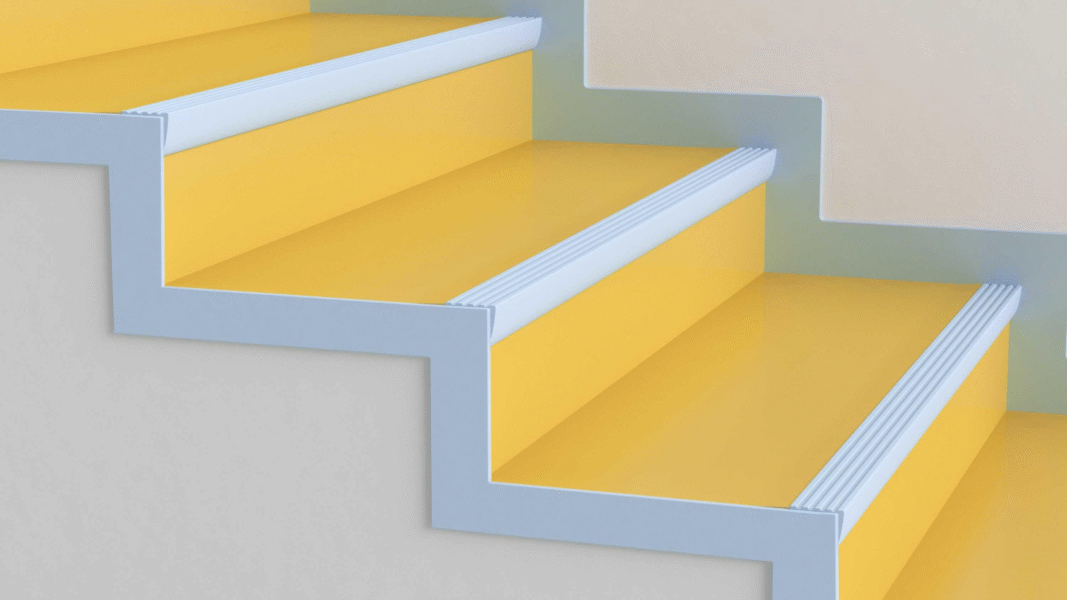
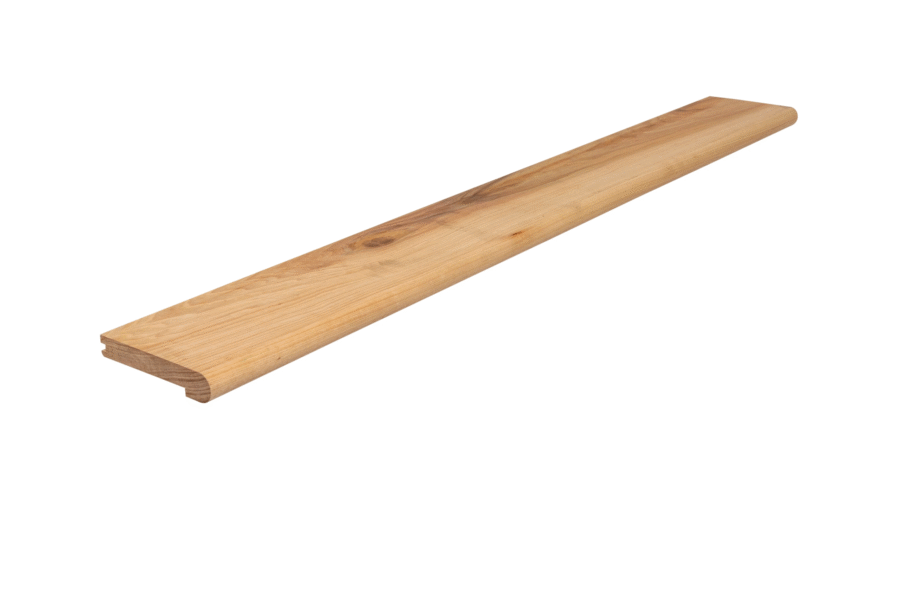
Your selection of material depends on staircase material type (wood or concrete) together with environmental conditions (indoor or outdoor) and financial resources. Rubber and aluminum work best for high-traffic spaces yet wood provides a sophisticated home aesthetic but demands more maintenance work.
Installation Guide
DIY installation of stair nosing becomes possible when you have appropriate tools and preparation methods. Here’s a step-by-step guide:
Preparation
- Measure the stair tread width using a tape measure.
- The stair surface needs to be dry and clean with no debris or old adhesive present.
- The installation tools consist of a tape measure, pencil, hacksaw (for aluminum), tin snips (for vinyl), electric drill, caulk gun, hammer, drill bit set, and metal file (if needed).
- The installation requires stair nosing strips and adhesive caulk
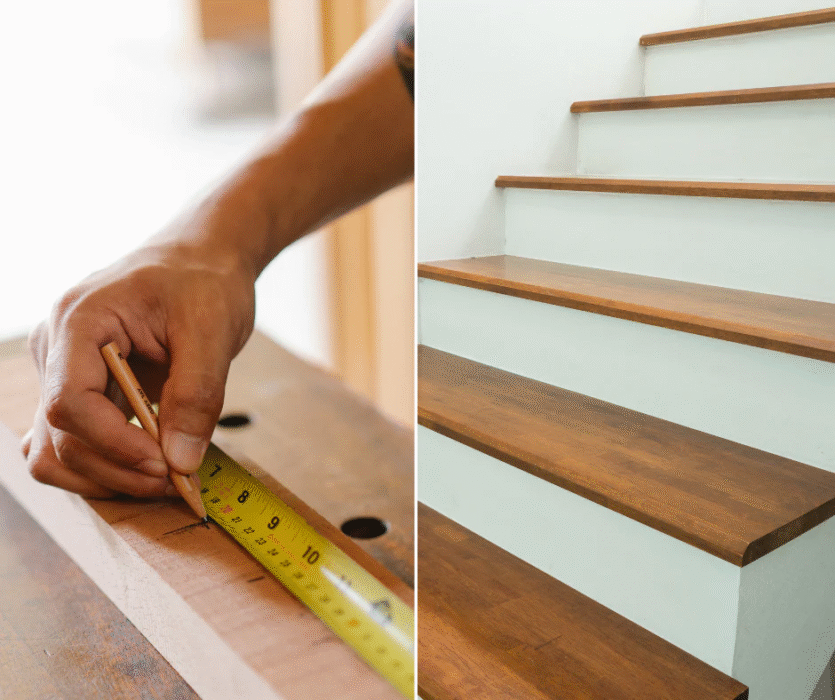
Installation Steps
- Cut to Size: Trim the nosing strip to the measured length using a hacksaw for aluminum or tin snips for vinyl.
- Dry-Fit: Position the strip to ensure a proper fit.
- Pre-Drill (if necessary): For hard surfaces like hardwood or tile, pre-drill pilot holes to prevent splitting.
- Apply Adhesive: Run a 1/4-inch to 3/8-inch bead of adhesive caulk along the back of the nosing strip.
- Secure in Place: Place the strip while securing it with nails then remove any surplus adhesive.
Precautions
- The surface needs to be clean along with dry conditions for better adhesion to occur.
- The nosing needs to be positioned correctly to prevent misalignment.
- The bond becomes secure through forceful pressure application.
- The installation of embedded nosing systems requires professional expertise when performing such complex work.
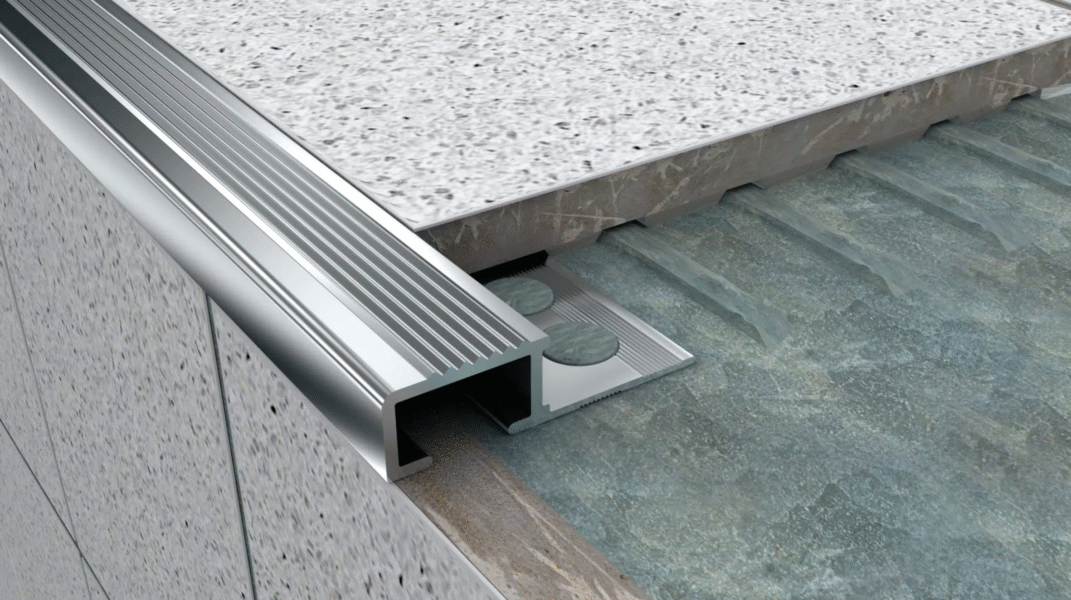
Maintenance and Care
Proper maintenance ensures stair nosing remains safe and attractive:
- The first maintenance step involves sweeping or vacuuming to eliminate dirt particles and debris. A gentle cleaning with a damp cloth should be used but you should avoid applying too much moisture since this could damage the
- The maintenance of wooden nosing requires wood-specific cleaners to protect its finish and prevent drying out.
- Regular inspections should be performed to check fastener tightness because immediate tightening ensures stability of the structure.
- Replace When Needed: Replace cracked or worn nosing to maintain safety and appearance.
- Professional Repairs: For complex issues, such as damaged embedded nosing, hire a professional.
Conclusion
Stair nosing stands as an essential component for staircase design because it delivers safety functions together with durability and attractive design elements. Selecting the right nosing for your needs requires knowledge about different types and materials alongside installation methods and maintenance practices. Quality stair nosing serves as a valuable investment that provides both practicality and visual appeal for home and commercial staircase upgrades and compliance purposes.
Our Products
Latest Articles
Get A Free Sample
Try out the products you are interested in and get free samples. See the quality for yourself and let’s start working together right away.
Get In Touch Today
After you fill out the form, We will contact you within 24 hours.
The first objective will be to understand your needs, then develop a business plan together and provide you with the best pricing!
Address
Workshop No. 3 (Self - designated), Sizhong Industrial Zone, Dazhen Community, Dali Town, Nanhai District, Foshan City
Tel
+86 13392243769
+86 13392243769
senmry@vip.163.com







